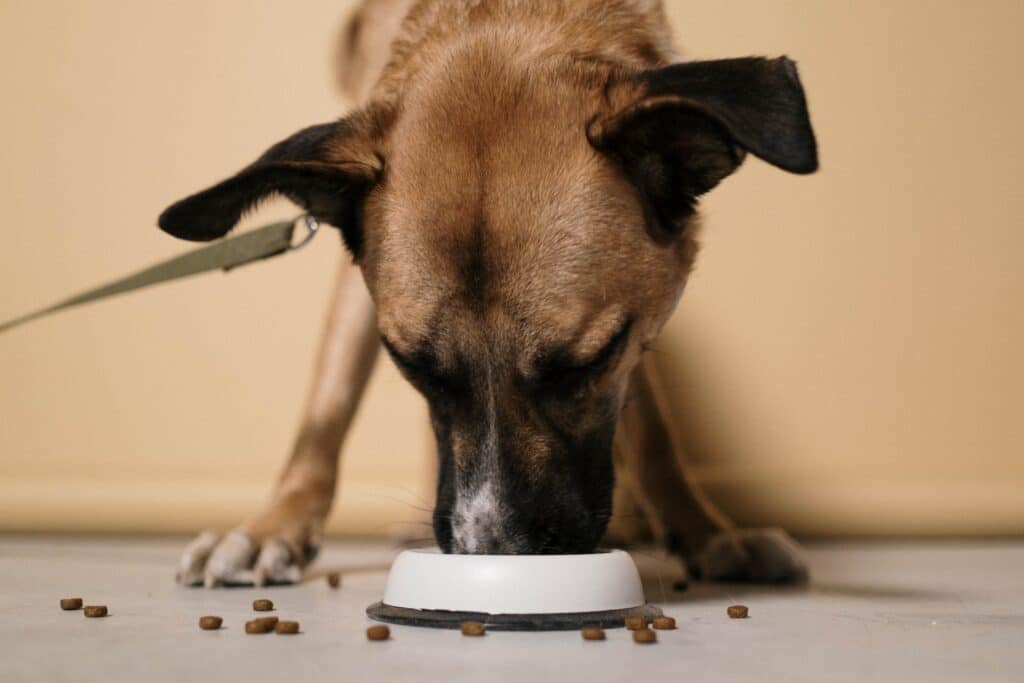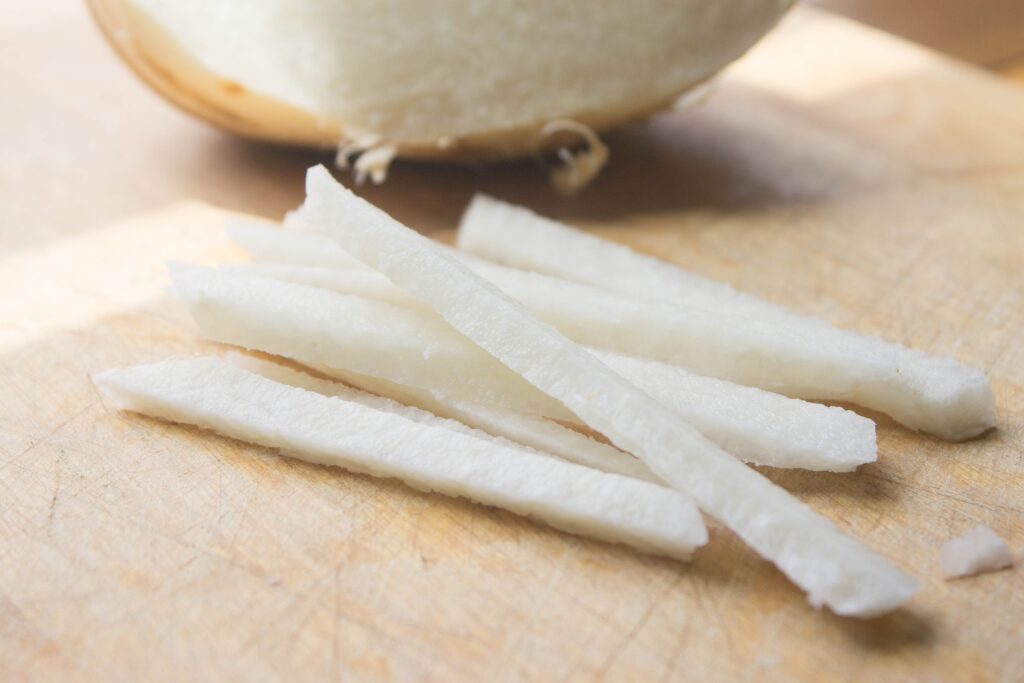One of the most popular Mexican snacks is jicamas, which are always in demand as the weather starts to heat up. Made with chile and lemon, these fiber-rich tubers are so delicious that even dogs yearn for them. How worthwhile is it to try him? Can dogs eat jicama?
If your dog has a sweet tooth like you and sees you enjoying fresh foods like fruits and these sweet root vegetables, I have good news for both of you: jicamas are a product that the dog can consume without issue.
Naturally, you must bear in mind that the manner in which you prepare the jicama may not be particularly good for the dog, and it is better to avoid serving it to the dog if you season it with salt, lemon, chili, or another flavoring like Maggie sauce or another hot sauce. On the other hand, since jicama includes a lot of nutritional fibers, giving him a fresh amount of only jicama might be quite beneficial for the dog.
Table of Contents
This is a great snack for dogs that need to follow dietary restrictions to maintain their weight since it is high in vitamin C, iron, and potassium and low in calories and fat. Given that jicamas is a superior meal that will offer many advantages, it is more appropriate to feed it to dogs that have diabetes or pancreatitis.
Antioxidants, which are also important for dogs to prevent cell damage produced by free radicals and even oxidative stress, which may also have an impact on their health, are another fantastic quality of this diet.

Jicama is, in fact, a delectable natural meal that, in addition to being very sweet, nourishes the spirit. Veterinarians and canine nutritionists are now researching ways to combine these tubers, which are full of fiber that assists digestion and improves your cardiovascular system.
Jicama can be fed to dogs if it is cut into 1 to 2 cm sticks and refrigerated. Put them in the freezer if it’s really hot outside, then take them out and offer the dog a tasty treat to nibble on. Of course, it’s best to cut them into sticks that the dog can grip and bite so you don’t have to worry about him swallowing them whole and risking blockages or asphyxia.
Jicama is one of the healthiest treats you can offer your dog every day. Packed with vitamins, fiber, antioxidants, and other nutrients, this root vegetable will support the health of his digestive, immunological, and cardiovascular systems.
Let’s see if can dogs eat jicama. Or not. One of the most fantastic root vegetables that you likely have a good familiarity with is jicama. Thankfully, more individuals are beginning to consume jicama regularly. But as more and more individuals start including jicama in their diets, the question of whether jicama is safe for dogs emerges.
Read : Can dogs eat spam?
Can dogs eat jicama?
Jicama is a hybrid between an apple and a water chestnut. Jicama is cultivated on vines, which may reach a length of 20 feet, in contrast to other root crops. Jicama, which is native to Mexico and South America, is also known as yam bean, Mexican potato, and Mexican turnip (though it is unrelated to yam). Throughout Central America for millennia, people have consumed tuberous legumes. Pachyrhizus erosus, its scientific name, translates to “thick root” in Greek.
Jicama is safe for dogs to consume. Jicama is a nutritious treat for dogs since it is high in iron, potassium, dietary fiber, and vitamin C. Jicama is nutrient-dense and low in fat and calories. Jicama is an advantageous meal for dogs with weight issues, as well as for canines on pancreatic or diabetic diets, thanks to these three characteristics.
Dogs, however, can only consume the bulbous jicama root. Dogs are poisoned by the jicama plant’s leaves, substance, and seeds. You won’t need to bother with these sections of the plant, though, unless you’re growing jicama in your garden. The jicama plant’s harmful components will not be in contact with you or your dog since supermarkets only sell the jicama root bulb at your neighborhood market.
Jicama benefits for dogs
Antioxidants are in abundance Jicama offers dogs four necessary antioxidants—vitamin C, vitamin E, selenium, and beta-carotene—in just a 1/4 cup meal. Dogs are protected by antioxidants against the harmful chemicals known as free radicals, which result in oxidative stress and harm cells.
Cancer, heart disease, and mental health issues are all connected to oxidative stress. Jicama and other foods high in antioxidants lower your dog’s chance of contracting certain illnesses.
Advantageous for a balanced intestinal flora Jicama has a lot of inulin, a prebiotic fiber that feeds your dog’s beneficial intestinal bacteria. When dogs eat a prebiotic diet, their “good” gut bacteria increase and their “bad” gut bacteria decrease, providing a well-balanced gut flora that is beneficial to their weight, mood, and general health. immune.
It can raise cardiovascular fitness. Jicama gives your dog two essential nutrients that are known to enhance heart health.
Jicama is high in soluble dietary fiber, which helps reduce canine LDL cholesterol. Jicama’s soluble fiber keeps bile from being reabsorbed in the intestines, which helps dogs naturally decrease their cholesterol levels.
Jicama also includes a significant quantity of potassium, which has been associated by veterinary experts with decreasing blood pressure in dogs by relaxing blood vessels. According to one study, potassium boosts circulation and guards against heart and stroke illnesses.
Healthy digestion is encouraged. Jicama’s dietary fiber aids in healthy digestion and gastrointestinal function in addition to improving your dog’s cardiovascular system. Jicama is an excellent treat for dogs that are experiencing diarrhea since the dietary fiber helps to thicken the stool.
Jicama is loaded with inulin in addition to dietary fiber and antioxidants. According to one study, inulin may enhance your dog’s bowel movements by up to 31%, which is encouraging for puppies who are constipated. Jicama is therefore a fantastic digestive regulator for dogs that have erratic bowel motions.

Read : Can Dogs Eat Sushi? Is sushi healthy for dogs?
Jicama preparation for dogs
It might be challenging for dogs to digest unfamiliar meals. Usually, nothing major happens. When eating new foods presents a challenge, the symptoms are frequent digestive distress, an upset stomach, and, in severe cases, diarrhea or vomiting. Because the indications are so subtle, dog owners are frequently unaware when their canines are in distress.
When giving your dog new foods, like jicama, it is advisable to prepare for any complications by gradually introducing tiny portions of the meal over 1 to 2 weeks. This introduction technique helps dogs acclimate with less difficulty.
Jicama may be consumed by dogs both raw and cooked. You may feed jicama to dogs either cooked or uncooked. Jicama can be provided in little portions or crushed and sprinkled over your dog’s meal.
Do you have any worries about giving dogs jicama?
When giving jicama to dogs, the main danger is poisoning from the leaves, stems, skin, and seeds. Your dog wouldn’t experience any issues if you offered him the jicama plant’s bulbous root.
Related : Can dogs eat bacon? Is Bacon Bad for Dogs? How much bacon should a dog eat?
Final thoughts : Can dogs eat jicama?
Jicama, a fruit native to Mexico and South America, makes a nutritious treat for dogs. This tasty, crispy root vegetable is still uncommon in other nations, but that is changing as more nations adopt Latin American cuisines into their diets.
Dogs may eat the bulbous root of the jicama plant, but the leaves, broth, skin, and seeds are poisonous. However, as most supermarkets only stock the edible portion of the jicama plant, this is not a major worry.
References : https://www.nutrition-and-you.com/jicama.html